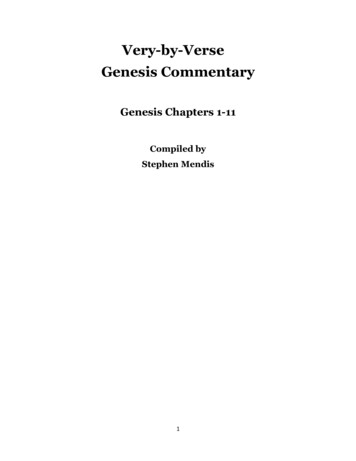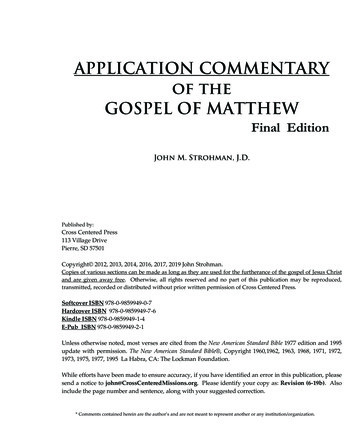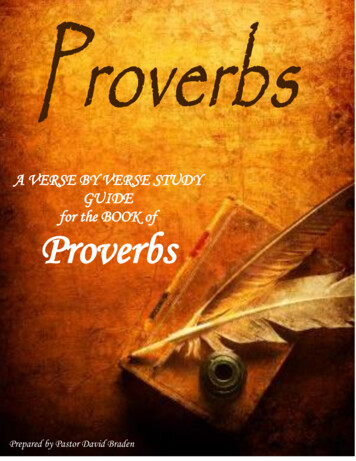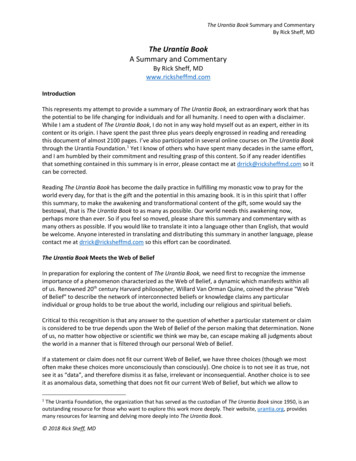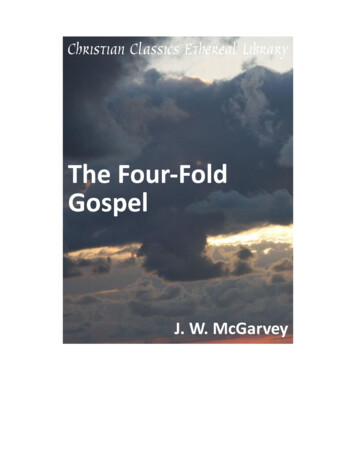
Transcription
Verse by Verse Commentary on Gospel ofMatthewDuncan HeasterPublished: 2014Categorie(s):Tag(s): christadelphian matthew gospel commentary versechapter1
Chapter1IntroductionIntroductionEvery true Christian has a solemn duty to make a seriousstudy of the Gospel records. The depth and nature of the studywill vary widely between individuals; for each individual relationship with the Lord Jesus is unique, and we are all wired differently. These notes are part of my personal path in seeking toknow Him through the medium of the written word, and I onlyshare them with you in the hope they may play a part in helping you in some aspects of your knowing of Him. But at the outset, be aware that the written word of the Gospel records is notthe only way to know Jesus. He makes Himself known to us invarious ways. The written word is but one of them- but withoutit, the other ways of the Lord’s self-revelation are unlikely tobe perceived by us as intended. Hence this book.I’ve read a lot of theology and Biblical studies. Much is madeof the differences between the Gospel records, and there arevarious arguments about structure. I make little reference tothese things; not because I am ignorant of them, but becausenone of the theories presented strike me as very compelling.There are so many suggested structures- but the multiplicity ofthem suggests that they are in the eye of the beholder ratherthan in the intention of the writer. And more significantly, I failto perceive in the genre of the Gospel records any intention bythe authors (nor the inspired Author behind them) that the interpretation of their words depends upon perception of structure. Nor does their interpretation and meaning appear to beenhanced by any theories of how (e.g.) Matthew may have borrowed from Mark or ‘Q’.By all means let me know if I’ve got something really wrongin any of my thoughts. Join me in praying daily to understand2
our Lord Jesus, and to understand, trust and obey His words.Know Him, that we might make Him known. Read somethingfrom the Gospels each day, and meditate upon it. And therebymay the word become flesh in each of us, as it was in Him toperfection. And may we learn ever more deeply the simpletruth many of us were taught from early childhood: “Jesusloves me, this I know- for the Bible tells me so”.For Him,Duncan Heasterdh@heaster.orgContentsChapter 1Chapter 2Chapter 3Digression 1 John and Isaiah 40Chapter 4Digression 2 The Wilderness TemptationsChapter 5Chapter 6Chapter 7Digression 3 “Judge not”Chapter 8Digression 4 "Let the dead bury their dead”Digression 5 Legion and the Gadarene PigsChapter 9Digression 6 The Table Manners of JesusChapter 10Digression 7 Matthew 10:16-39 And The Last DaysChapter 11Chapter 12Digression 8 Unclean Spirits in Mt. 12:44,45Digression 9 Mary’s Mid-Life CrisisChapter 13Digression 10: The PARABLE OF THE WHEAT AND TARESIN A LAST DAYS CONTEXTChapter 143
Digression 11: The Openness of Jesus in Feeding the 5000Chapter 15Chapter 16Digression 12: Peter The RockDigression 13: The Compulsion Of The CrossChapter 17Digression 14: Curing of Psychosomatic IllnessChapter 18Digression 15: What Is Conversion?Digression 16: The Indebted Servant of Luke 16Chapter 19Chapter 20Chapter 21Digression 17: Jesus: A Man MisunderstoodDigression 18: The Two Sons (Mt. 21:28-32)Digression 19: The Hopefulness of the Father and SonChapter 22Digression 20: Two Invitations- Matthew 22:4Digression 21: The Living Word of GodChapter 23Chapter 24Digression 22: The Nature of ProphecyDigression 23: The Upper Room Discourse (John 14-16) andthe Olivet ProphecyDigression 24: Does The Olivet Prophecy Have A Break InFulfillment?Digression 25: Conditional Prophecy in DanielDigression 26: With Jesus to JudgmentDigression 27: The Blossoming Of The Fig TreeDigression 28: Do we Know the Day and the Hour ?Digression 29: The Days of Noah and the Last DaysChapter 25Digression 30: A Chronology Of Judgment?Digression 31: God And TimeDigression 32: The Devil and His AngelsChapter 26Digression 33: Caiaphas As “The prince of this world”Digression 34: Was the Last Supper Restricted?Digression 35: The Jewish Satan4
Chapter 27Digression 36: “As a sheep before her shearers”Digression 37: The Possibility Of Avoiding The CrossDigression 38: Ongoing Crucifixion And DeathDigression 39: The Reality of CrucifixionDigression 40: Joseph And NicodemusDigression 41: The Central Place of the Crucifixion in theGospel RecordsChapter 28Digression 42: The Chronology Of The Resurrection OfChristAppendices:Appendix 1: The Origin of the Gospel RecordsAppendix 2: The Seven Sayings from the CrossAppendix 3: The Great Commission5
Chapter2Matthew Chapter 1MATTHEW CHAPTER 1The Genealogy of JesusThe book of the generation of Jesus Christ, the son of David,the son of Abraham. 2 Abraham begot Isaac, Isaac begot Jacob,Jacob begot Judah and his brothers. 3 Judah begot Perez andZerah of Tamar and Perez begot Hezron, Hezron begot Ram. 4Ram begot Amminadab, Amminadab begot Nahshon, Nahshonbegot Salmon. 5 Salmon begot Boaz of Rahab and Boaz begotObed of Ruth and Obed begot Jesse. 6 Jesse begot David theking. And David begot Solomon of her that had been the wife ofUriah. 7 And Solomon begot Rehoboam, Rehoboam begot Abijah, Abijah begot Asa. 8 Asa begot Jehoshaphat, Jehoshaphatbegot Joram, Joram begot Uzziah. 9 Uzziah begot Jotham,Jotham begot Ahaz, Ahaz begot Hezekiah. 10 Hezekiah begotManasseh, Manasseh begot Amon, Amon begot Josiah. 11 Josiah begot Jechoniah and his brothers, at the time of the captivity in Babylon. 12 And after the captivity in Babylon, Jechoniahbegot Shealtiel, Shealtiel begot Zerubbabel. 13 Zerubbabel begot Abiud, Abiud begot Eliakim, Eliakim begot Azor. 14 Azorbegot Sadoc, Sadoc begot Achim, Achim begot Eliud. 15 Eliudbegot Eleazar, Eleazar begot Matthan, Matthan begot Jacob.16 Jacob begot Joseph the husband of Mary, of whom was bornJesus, who is called Christ. 17 So all the generations fromAbraham to David are fourteen generations and from David tothe captivity in Babylon fourteen generations and from the captivity in Babylon to the Christ fourteen generations.The Birth of Jesus18 Now the birth of Jesus Christ was as follows. When hismother Mary had been betrothed to Joseph, before they cametogether, she was found with child of the Holy Spirit. 19 And6
Joseph her husband, being a righteous man and not willing tomake her a public example, decided to send her away secretly.20 But as he thought on these things, an angel of the Lord appeared to him in a dream, saying: Joseph you son of David, donot be afraid to take Mary as your wife, for that which is conceived in her is of the Holy Spirit. 21 And she shall give birth toa son, and you shall call his name Jesus; for it is he that shallsave his people from their sins. 22 Now all this happened sowhat was spoken by the Lord through the prophet might be fulfilled, saying: 23 The virgin shall be with child and shall givebirth to a son; and they shall call his name Immanuel, whichmeans God with us. 24 And Joseph woke from his sleep and didas the angel of the Lord commanded him, and took Mary as hiswife. 25 But he did not have sexual intercourse with her untilshe had given birth to a son; and he called his name Jesus.1:1 Book of the generation- “Book”, Gk. biblos, suggests aformal volume. It could be that Matthew refers only to thegenealogy- but in this case, biblos hardly seems the appropriate word. The Gospels were transcripts of the Gospel messagepreached by e.g. Matthew, and as time went on and the Lorddidn’t return, under inspiration they wrote down their standardaccounts of the good news. The Greek genesis translated“generation” is also translated “nature” in its’ other two occurrences (James 1:23; 3:6). If the “book” refers to the book of theGospel of Matthew, the idea could be that this is a Gospelwhich focuses upon the nature of Jesus. Related words occuroften in the genealogies- people “begat” [Gk. gennao] theirdescendants, until Jesus was gennao of Mary (Mt. 1:16). Jesusas a person had a ‘genesis’, He was ‘generated’ by Mary as Hisancestors had been ‘generated’ by the ‘generations’ of theirancestors- the whole chapter is a huge blow to the idea thatJesus pre-existed as a person before His birth. His ‘generation’is presented as being of the same nature as the ‘generation’ ofHis human ancestors.Son of Abraham- The Roman emperors and Greek heroessometimes traced their pedigree back to a god- and thereforethe genealogy of Jesus, whom the Gospels present as the ultimate Emperor, is quite radical in this regard. For it traces the7
pedigree of Jesus back to a man, Abraham. The greatness of Jesus was in his humanity.1:2 Judah and his brothers- The fact Isaac and Jacob hadbrothers is carefully omitted- because the descendants of Ishmael and Esau were not counted as the people of God.1:3 Phares and Zara- Since Jesus was descended through theline of Phares, why mention the birth of Zara- seeing that somany details are omitted in this genealogy, even whole generations, why take space to record this? Perhaps it was becauseZara was the first born, but Phares got the birthright. And thegenealogies teach us how God delights to work through the underling, the rejected, the humanly weak.Tamar- A prostitute and adulteress, just like Rahab. See on1:5.1:5 Salmon- Of the tribe of Judah, because this is the genealogy through Judah (1:2). The two spies who had been faithfulthe first time when spies were sent out were Joshua and Calebof the tribes of Ephraim and Judah (Num. 13:6; Jud. 2:9). Itseems a fair guess that when the two spies were sent out, theywere from these same two tribes. Salmon was a prince of thetribe of Judah- it’s a fair guess that he was one of the two spieswho went to Rahab, and he subsequently married her.Rahab- A Gentile and a sinner. Jesus was morally perfect,and yet the genealogy shows how He had much against Himspiritually. We can’t blame our lack of spirituality upon our badbackground. Note that there was so much intermarriage withGentiles like Rahab and Ruth throughout Israel’s history; theirstanding with God was therefore never on the basis of ethnicpurity, but rather by cultural identity and God’s grace. Matthew’s genealogy features [unusually, for Jewish genealogies]several women, who had become the ancestors of Messiahthrough unusual relationships. It’s almost as if the genealogy isthere in the form that it is to pave the way for the account ofMary’s conception of Jesus without a man.1:6 David the king- Literally “the David the king”. The othersaren’t mentioned as being kings. The implication may be thatJesus was the promised descendant of David and the promisesof eternal Kingship made to David’s descendant are thereforeapplicable to Jesus.8
Of Uriah- Literally “she of Uriah”. “She that that been thewife of” is added by some translators in explanation, but isn’tin the original. Whilst God ‘forgets’ sin in the sense that He nolonger holds it against us, the memory of those sins isn’t obliterated, and His word is full of such allusions to sin which although He has forgiven it and symbolically “blotted it out”, itstill remains within Divine history. We too can forgive but ‘forgetting’ isn’t always possible, and is no sign that we have failedto forgive.1:7 Roboam Abia - Wicked Roboam begat wicked Abia;wicked Abia begat good Asa; good Asa begat good Josaphat;good Josaphat begat wicked Joram. Perhaps the emphasis isthat spirituality isn’t genetic, and neither is sinfulness. Jesuswas perfect despite being from such “bad blood”; and we likewise can’t blame our failures on bad background. Neither canwe assume that the children of the faithful will be righteous.1:8 Joram begat Ozias- Three generations are skipped here.See on 1:17. Perhaps the omission was because Joram marriedAthaliah, daughter of Jezebel the wife of Ahab, and those generations were idolaters. As we note on 1:12, children who don’tworship the true God are forgotten in the ultimate course ofDivine history. In this case, his iniquity was indeed visited uponthe third generation (Ex. 20:3-6).We also see here a fulfilmentof the prophecy that Ahab’s house would be eradicated (2Kings 9:8).1:11 Jechonias- The apparent contradiction with 1 Chron.3:5,6 is solved if we understand this to be a reference toJoachin.1:12 Jechonias begat Salathiel- Therefore the reference toJechoniah being written “childless” (Jer. 22:30) perhaps meansthat as Jeremiah goes on to comment “No man of his seed shallprosper”. If our children aren’t spiritually prosperous, it is as ifwe were childless. Thus we see that the whole purpose of having children is to “raise a Godly seed”.1:14 Sadoc- Zadok. But there was a Levite at this time alsocalled “Zadok” (Neh. 10:21). It could be that this person wasdescended from both Judah and Levi through an inter-tribalmarriage of his parents. In this case he would’ve been apotential king-priest, preparing the way for us to understandJesus as a king-priest.9
1:15 Matthan- The genealogies prove that Joseph was a descendant of David, indeed the rightful king of Israel had therebeen a monarchy at the time of Jesus. Jesus was his adoptedson; he was "as was supposed", or 'as was reckoned by law',the son of Joseph (Lk. 3:23). The record in Luke appears to bethat of Mary; Joseph being "the son of Heli" was probably byreason of marrying Mary, the daughter of Heli (Lk. 3:23); theTalmud speaks with gross vitriolic about Mary the daughter ofHeli going to hell for her blasphemy, referring to Mary themother of Jesus. This shows that the Jews accept that Marywas the daughter of Heli. Heli's father was Matthat, who canbe equated with Matthan the grandfather of Joseph. Thus Maryand Joseph were cousins (hinting at an arranged marriage?),and therefore Jesus was a son of David through both his mother and father by adoption. In the light of this it is evident thatthe question mark over the validity of a genealogy throughJoseph is an irrelevancy, seeing that Joseph and Mary had acommon grandfather. The point has to be made that a humanlyfabricated genealogy would be sure to make some glaring errors, especially if it was produced by simple, uneducated menas the Jews claim the New Testament was. The wonder of theNew Testament genealogies is that closer study reveals evermore intricate internal evidence for their truth and reliability,rather than exposing more problems.1:16 Lk. 3:27 describes Zerubbabel as the head / chief / leader. The term Rhesa is incorrectly rendered in many versions asa name. Perhaps Luke’s point was that the Lord Jesus was thefinal Messiah, after the failure of so many potential ones beforehand. ‘Zerubbabel the chief’ would then be a similar rubricto “David the king” in Matthew’s genealogy (Mt. 1:16).Joseph was actually the rightful king of Israel, according tothis genealogy. Yet he was living in poverty and without recognition for who he was- exactly the kind of person God woulduse for the great task of raising His only begotten Son.1:17 Forty two- This must have some connection with the 42stopping places before Israel reached Canaan, as described inNum.33:2. Thus the birth of Christ would be like God's peopleentering the promised land of the Kingdom in some way. Itcould be argued from this (and other evidence) that it wasGod’s intention for the Kingdom to be entered by Israel at the10
time of Jesus- it was after all, His intention that Israel acceptedtheir Messiah. But they crucified Him, and therefore the potential didn’t come true. This open ended nature of God’s prophetic program means that it’s impossible to fit together all latterday prophecies into some chronological framework.The genealogy presented by Matthew doesn’t include everygeneration, there are some gaps (see on 1:8; and Zorababelwas Salathiel’s grandson, 1 Chron. 3:19, yet 1:12 says be“begat” him). Thus some “begat” their grandson or greatgrandson. Clearly Matthew had a purpose in presenting thematerial like this- but expositors have failed to come up withanything convincing. It could simply be that the Gospels weredesigned to be memorized, as most Christians were illiterate;and the 3 x 14 structure was to aid memorization. One interesting observation is that the last 14 generations from the captivity to the time of Christ amount to the 490 years prophesied forthis same period by Dan. 9:25- if we take a generation to be 35years, which it is in Job 42:16. The numerical value of theHebrew word “David” is 14, so it could also be that Matthew iseloquently demonstrating that Jesus was indeed the promisedseed of David. If indeed six is the number of man and sevenrepresents perfection, then 6 x 7 42- the generations culminated in the perfect man, Jesus.1:18 Found with child of the Holy Spirit- The Greek seems toimply she was understood [“found”] to be with a child whichhad come ek, out of, from, the Holy Spirit. This could be implying that Joseph himself believed or perceived that the child wasfrom the Holy Spirit. This would explain why he sought not tohumiliate her publically about the matter (1:19).The descriptions of Mary as keeping things in her heart (Lk.2:19,52), and the way it seems she didn’t tell Joseph about theAngel’s visit, but instead immediately went down to Elisabethfor three months all these are indications that Mary, likemany sensitive people, was a very closed woman. Only whenMary was “found” pregnant by Joseph (Mt. 1:18- s.w. to see,perceive, be obvious) was the situation explained to him by anAngel. It seems His move to divorce her was based on his noticing she was pregnant, and she hadn’t given any explanation tohim. She “arose” after perhaps being face down on the groundas the Angel spoke with her, and went immediately off to11
Elisabeth. And then, after three months she returns evidentlypregnant (Lk. 1:39). Mary is portrayed as somehow separatefrom the other ministering women. It would have been psychologically impossible, or at best very hard, for the mother of theLord to hang around with them. The group dynamics wouldhave been impossible. Likewise in Acts 1:14 we have “the women, and Mary the mother of Jesus”, as if she is separate fromthem. She followed Him to Cana, uninvited, and also to Capernaum. Next she is at the cross risking her life, but she isn'tamong the women who went to the grave. Why not? It wassurely natural that she would go there, and that the other women would go with her to comfort her. But she was a loner;either she went alone, as I think I would have tried to, or shejust couldn’t face contact with the others and simply hid away.And could it be that Jesus, in recognition of her unique perception of Him, appeared to her first privately, in a rightfully unrecorded meeting? But by Acts 1:14, she was in the upper room,as if His death led her to be more reconciled to her brethren,to seek to get along with them although by nature, in herheart and soul, she was a loner, maybe almost reclusive. Astruggler to understand. A meditator, a reflector, who justwanted to be alone, one of those who take their energy fromthemselves rather than from other people.1:19 A just man- The very same phrase is used by Matthew todescribe Christ as the ultimately just or righteous man as Hehung upon the cross (27:19,24; Lk. 23:47; 1 Pet. 3:18); the implication is surely that Joseph’s just or righteousness played arole in the final perfection of Jesus as the ultimately “justman”. For it was he who would’ve first taught Jesus the shema,emphasizing the word “one” as Jewish fathers did, correctingthe young Jesus as He stutteringly repeated it. The same termis used about Jesus now in His heavenly glory (Acts 22:14; 1 Jn.2:1) and as He will be at the day of judgment (2 Tim. 4:8); theinfluence of parents upon their children is in some sense eternal. For Jesus is the same yesterday, today and forever; we too,as the sum of all the influences upon us, will really be savedand immortalized as persons. And the same was true of Jesus;hence the words and style of Mary’s hymn of praise can befound repeated in the later words of Jesus, and also in thewords He spoke from Heaven to the churches in Revelation.12
Joseph had various alternatives open to him; the trial of jealousy of Numbers 5, divorce, seeking compensation from thefather, public shaming of the wife, or to stone her. But hisjustice was such that he sought to show grace and quietly divorce her (see on 1:20 Take unto you). Love protects fromshame, not as it were covering up sin which needs to be exposed, but seeking to cover over in the sense that God’s atonement covers over our sins, as 1 Cor. 13 defines at length.It was normal that the father of the crucified disposed of thebody. But another Joseph, also described as a “just man” asJoseph was (Lk. 23:50), was the one who took this responsibility; remember that Joseph was alive and known as the apparent father of Jesus during His ministry (Jn. 6:42). Likewise onewould think it appropriate that the first person to whom therisen Lord revealed Himself would’ve been to His mother, forshe after all was the channel of the whole marvelous thing, theonly one who for sure believed in a virgin birth. But by an apparently cruel twist of circumstance, it was to another Mary,Magdalene, that the Lord first revealed Himself, and it is sheand not His mother Mary who takes the message to others. Inthis context we recall how in His last mortal moments, Christmotioned to His mother that John and not He was now her son(Jn. 19:26), addressing her as “woman” rather than “mother”an unusual and even rude form of address to use to ones’ mother in public. In all this we see a conscious diminishing of thehuman significance of the Lord’s earthly family, in order to underline that now a new family of Jesus had been brought intoexistence by the cross. This must have been so hard for Josephand Mary, as it is for us- to realize that we are but channels,used by God in certain ways at certain times, to the development of His glory according to His program and not our own.1:20 The descriptions of Jesus as a "man", a human being,have little meaning if in fact He pre-existed as God for millionsof years before. The descriptions of Him as "begotten" (passiveof gennan in Mt. 1:16,20) make no suggestion of pre-existenceat all. And the words of the Lord Jesus and His general behaviour would have to be read as all being purposefully deceptive, if in fact He was really a pre-existent god. There is no hintof any belief in a pre-existent Jesus until the writings of JustinMartyr in the second century- and he only develops the idea in13
his dialogue with Trypho the Jew. The Biblical accounts of theLord's conception and birth just flatly contradict the idea ofpre-existence.He thought- The Greek en-thumeomai could mean to beangry or indignant, for that is how thumeomai is usually translated in the NT. His anger and frustration would still be possible even if he correctly perceived that the child was from God(see on 1:18).Fear not- A common experience of Joseph. The three Angelicappearances to him which are recorded show him immediatelyresponding. Such immediacy of response is typical of God’sfaithful servants; delay in these cases is so often an excuse forinaction and disbelief. The Greek phobeo is also used of reverence and awe before God. Perhaps he understandably thoughtthat he could in no way marry and sleep with a woman whohad been the channel of God’s Spirit to produce His only begotten son. Those thoughts surely did cross his mind, whateverview we take of phobeo here. We see here the sensitivity ofGod to human fears and feelings; He knows our thoughts andfears perfectly, and gives the needed assurance. The messagethat “that which is conceived of her is of the Holy Spirit” wouldtherefore have had the emphasis upon the word “is”, confirming Joseph in his perception (see on 1:18- he had perceived [AV“found] that the child was of the Holy Spirit).Take unto you- The implication could be that they were aboutto marry, when it became apparent Mary was pregnant. He immediately married her (:24), seeking to protect her from theshame of the situation, thereby giving the impression that thechild was his.1:21 Save His people from their sins- But the mission of Jesuswas to save “the world” (Jn. 3:17), to save those enter into Him(Jn. 10:9; Acts 2:21; Rom. 10:13). The “world” is ultimately thepeople of Christ whose sins have been forgiven.1:22 Saying- The present tense reflects the ongoing, livingnature of God’s word. Otherwise, a past tense would be required. What was spoken is still being spoken to each individual Bible reader / listener.1:23 God with us- God meta us means somewhat more thansimply “God with us”. The idea is also “among”. God is nowamong humanity through we who are the body of Christ.14
1:25 He called his name- The obedience of Joseph (in thiscase, to :21) is emphasized. Likewise 2:20,21 “Arise and hearose”.15
Chapter3Matthew Chapter 2MATTHEW CHAPTER 2Wise Men Visit Baby JesusNow when Jesus was born in Bethlehem in Judea in the daysof Herod the king, astrologers from the east came to Jerusalem, saying: 2 Where is he that is born King of the Jews? Forwe saw his star in the east and have come to worship him. 3And when Herod the king heard it, he was disturbed and allJerusalem with him. 4 And gathering together all the chiefpriests and scribes of the people, he inquired of them wherethe Christ should be born. 5 And they said to him: In Bethlehem of Judea. For thus it is written through the prophet: 6 Andyou Bethlehem, land of Judah, are in no way least among theprinces of Judah. For out of you shall come forth a Ruler, whoshall be shepherd of My people Israel. 7 Then Herod secretlycalled the Magi and learned from them exactly what time thestar appeared. 8 And he sent them to Bethlehem, and said: Goand search carefully for the young child, and when you havefound him, bring me word, that I may also come and worshiphim. 9 And they, having heard the king, went their way; andthe star which they saw in the east went before them until itcame and stood over where the young child was. 10 And whenthey saw the star, they rejoiced with exceedingly great joy. 11And they came into the house and saw the young child withMary his mother; and they fell down and worshipped him, andopening their treasures they offered to him gifts, gold andfrankincense and myrrh. 12 And being warned in a dream thatthey should not return to Herod, they departed for their owncountry by another route. 13 Now when they had departed, anangel of the Lord appeared to Joseph in a dream, saying: Arise16
and take the young child and his mother and flee into Egyptand stay there until I tell you, for Herod will seek the youngchild to destroy him. 14 And he arose and took the young childand his mother by night and departed into Egypt, 15 andstayed there until the death of Herod, that it might be fulfilledwhich was spoken by the Lord through the prophet, saying:Out of Egypt did I call My son. 16 Then Herod, when he sawthat he was deceived by the astrologers, was furious and sentout soldiers and slew all the male children that were in Bethlehem and in all the borders of it aged two years and under, according to the time which he had determined from the Magi.17 Then was fulfilled that which was spoken through Jeremiahthe prophet, saying: 18 A voice was heard in Ramah, weepingand great mourning, Rachel weeping for her children; and shewould not be comforted, because they are not. 19 But whenHerod was dead, an angel of the Lord appeared in a dream toJoseph in Egypt, saying: 20 Arise and take the young child andhis mother and go into the land of Israel, for they are dead thatsought the young child's life. 21 And he arose and took theyoung child and his mother and came into the land of Israel. 22But when he heard that Archelaus was reigning over Judea instead of his father Herod, he was afraid to go there. And beingwarned by God in a dream, he withdrew into the region of Galilee, 23 and he went and dwelt in a city called Nazareth. Thatit might be fulfilled which was spoken through the prophets,that he should be called a Nazarene.2:1 Wise men- Probably Jews from Babylon who had seen thesimilarity between the 'star' and the Messianic star out of Jacob whom Balaam had prophesied (Num. 24:17). Perhaps theyare called here magos, sorcerers, magic men, because this isthe image they presented to Herod, rather than stating theywere Jews in search of Judah's Messianic King. Daniel had oncebeen counted amongst the 'wise men' of Babylon (Dan. 2:48).2:2 The star did not take them directly to Bethlehem. It mayhave disappeared for a while, so they went to Jerusalem, assuming the king was to be born there. This would indicate theywere ignorant of Mic. 5:2, the prophecy of Messiah's birth inBethlehem, or had at least failed to interpret the prophecy17
properly. Seeing that stars do not move across the sky overtime in a way which can be followed on earth over a period ofdays or weeks, it's clear that again (see on :1), things are beingdescribed as they appeared to an observer on earth. It could bethat they first saw the 'star' two years previously (see on 2:16).Born King- Some kings become kings by revolution or war, others are born into a kingly line. They clearly understood thatthis king was in the kingly line of Judah- a direct descendant ofDavid.2:3 Disturbed- "All Jerusalem" were "troubled", whereas thebirth of Messiah was to be a time of joy for Israel and "to allpeople" (Lk. 2:10). The despised and lowly shepherds rejoiced,but "Jerusalem", perhaps referring to the Jewish ruling class,were "troubled". They rejected the good news of the Gospel because it threatened their little power structure. "All Jerusalem"cannot be taken literally because there were some in the cityawaiting the birth of Messiah and joyful at the news of Hisbirth (Lk. 2:38).2:4 Of the people- The priests are repeatedly described in theOT as the priests of Yahw
Verse by Verse Commentary on Gospel of Matthew Duncan Heaster Published: 2014 Categorie(s): Tag(s): christadelphian matthew gospel commentary verse chapter 1

